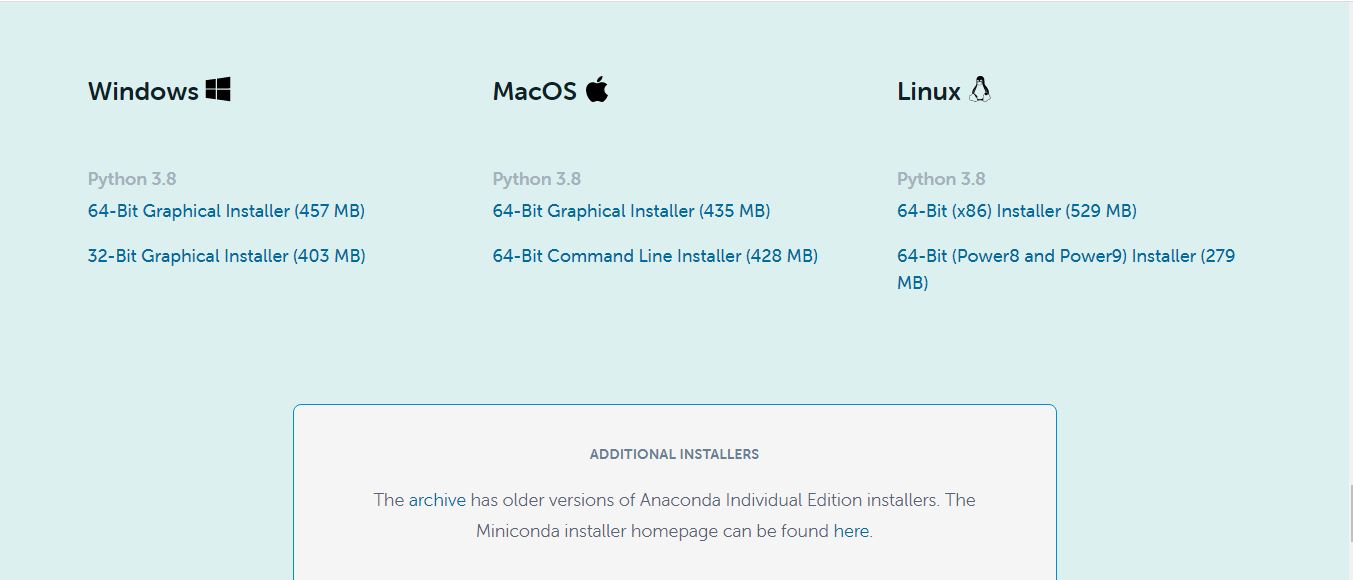How to create offline chatbot using Anaconda Navigator (Spyder)
Preliminaries
- Download
Anaconda https://www.anaconda.com/download
A chatbot is an artificially intelligent software that simulates a conversation with a user in natural language through messaging applications, websites, mobile apps, telephone, etc.Users communicate with these tools using a chat interface or by voice, just like they would converse with another person. Chatbots interpret the words given to them by a person and provide a pre-set answer. There are many types of chatbots available, a few of them can be classified as follows:
-
Text-based chatbot: In a text-based chatbot, a bot answers the user’s questions via text interface.
-
Voice-based chatbot: In a voice or speech-based chatbot, a bot answers the user’s questions via a human voice interface (e.g., Apple Siri, Amazon Alexa, etc.)
Steps
Step 1: Packages to install in an offline chatbot
- We first need to install an apt Anaconda package based on system requirements.
- After installing the package, we must run these commands on Anaconda Prompt:
pip install wikipedia
pip install wolframalpha
Step 2: Import the data from the wolframalpha.py.txt text file into the Spyder application in the Anaconda Navigator, else you can use this code:
// # Wiki-Bandara - a virtual assistant using Wolfram Alpha and Wikipedia
## dependencies
## pip install wolframalpha
## pip install wikipedia
import wolframalpha
import wikipedia
import re
## Wikipedia search function
def search_wiki(keyword=''):
# search in wikipedia
searchResults = wikipedia.search(keyword)
if not searchResults:
message = "Sorry, No result from Wikipedia. Try again."
response(message)
return
try:
page = wikipedia.page(searchResults[0])
except err:
page = wikipedia.page(err.options[0])
wikiTitle = str(page.title.encode('utf-8'))
wikiSummary = str(page.summary.encode('utf-8'))
return str(wikiSummary)[2:]
## Wolframalpha search function
def search(text=''):
res = client.query(text)
# check if query is resolved
if res['@success'] == 'false':
# search wikipedia if unsuccessful
response(search_wiki(text))
else:
result = ''
# pod0 contains query and pod1 contains result
pod0 = res['pod'][0]
pod1 = res['pod'][1]
if (('definition' in pod1['@title'].lower()) or ('result' in pod1['@title'].lower()) or (pod1.get('@primary','false') == 'true')):
result = resolveListOrDict(pod1['subpod'])
return result
else:
question = resolveListOrDict(pod0['subpod'])
question = question.split('(')[0]
search_wiki(question)
def resolveListOrDict(variable):
if isinstance(variable, list):
return variable[0]['plaintext']
else:
return variable['plaintext']
## Bot activity function
def activity(data):
# about bot
if re.search("are you", data) or re.search("your name", data):
listening = True
intro = "I'm Wiki-Bandaara. I have access to Wolfram|Alpha and Wikipedia."
response(intro)
# bot help
elif re.search("help", data) or re.search("you do", data):
listening = True
message = 'I have access to Wolfram|Alpha and Wikipedia. Ask anything. To get results from wikipedia, say so. To quit say bye or stop'
response(message)
# search only in wikipedia
elif re.search("in wikipedia", data) or re.search("from wikipedia", data):
listening = True
result = search_wiki(data)
if result!=None:
response(result)
# stop the bot
elif re.search("stop", data) or re.search("bye", data) or re.search("quit", data):
listening = False
print('Bot: Bye')
print('Listening stopped')
return listening
# search keyword
else:
listening = True
result = search(data)
if result is not None:
response(result)
else:
message = "Please try again."
response(message)
return listening
## Text response function
def response(data):
print('Bot:', data)
### main ###
## Wolframalpha App Id
appId = 'JH9XHR-W9J76L7H5A'
## Wolfram Instance
client = wolframalpha.Client(appId)
greet = "Hi there, what can I do for you?"
response(greet)
## loop till listening is False
listening = True
while listening == True:
data = str(input('User: ')).lower()
if data != '':
listening = activity(data)
else:
message = "Please try again."
response(message)
Step 3 : Run the code and give the inputs.
